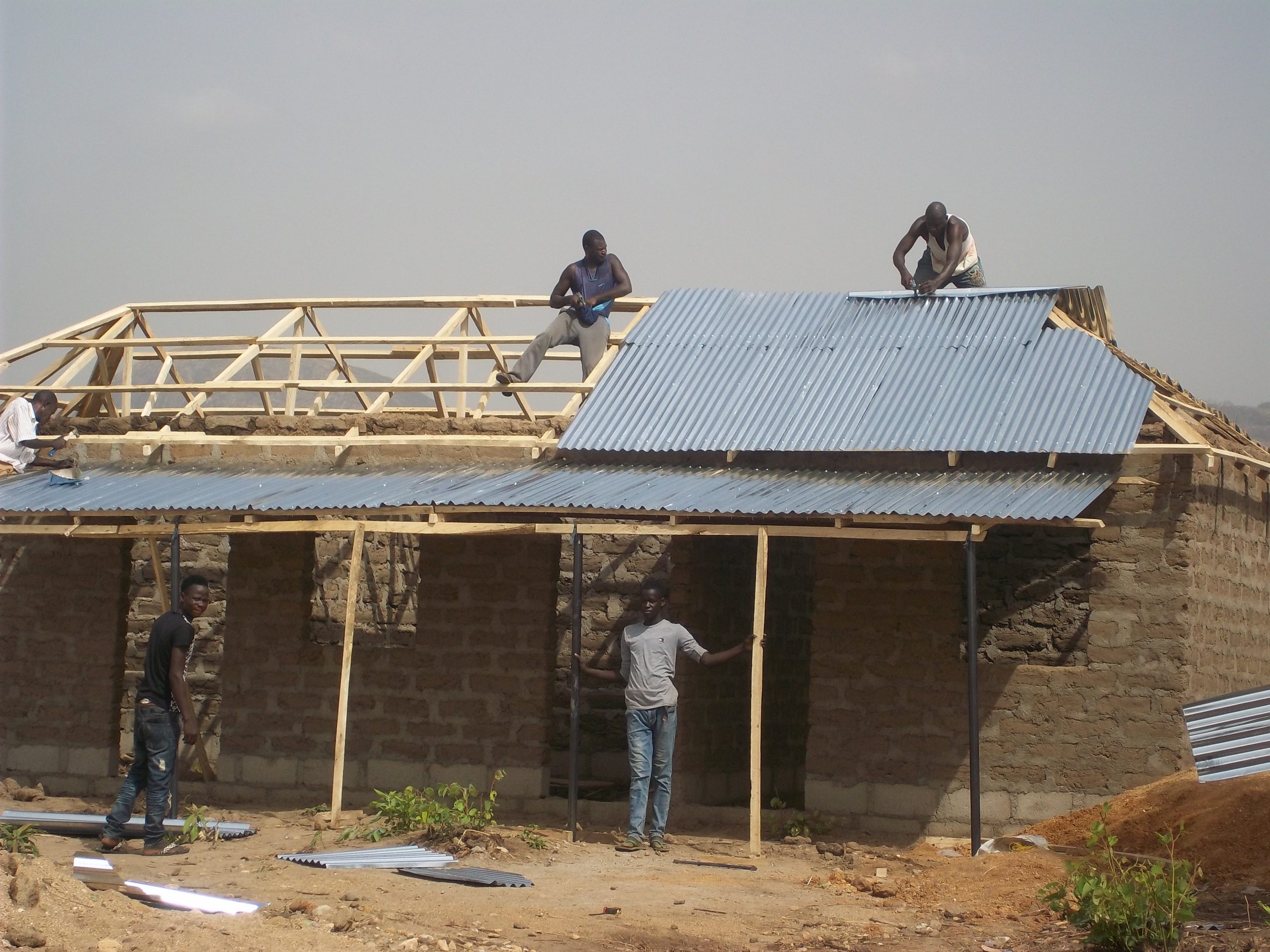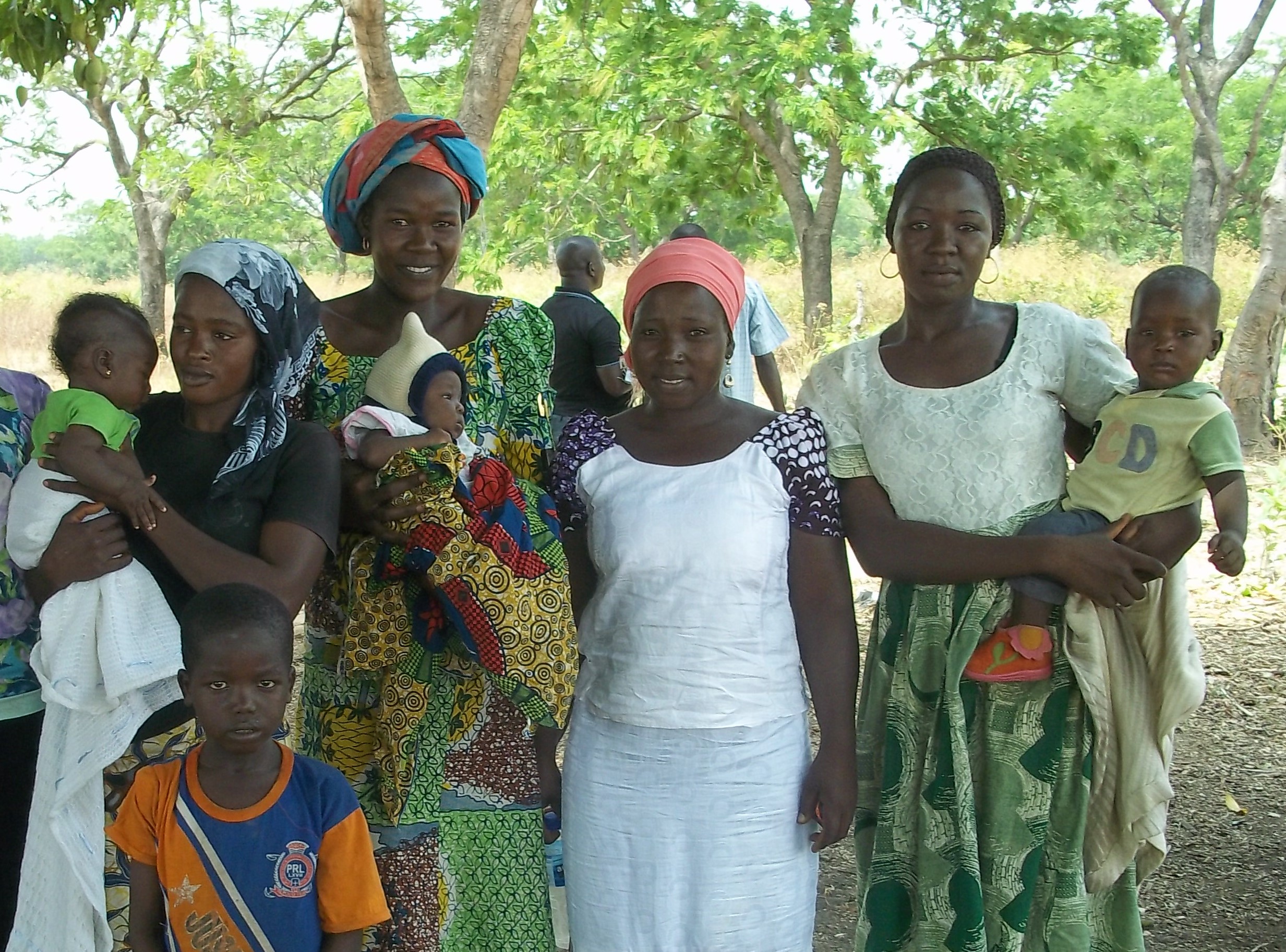CPTnet
6 June 2015
NIGERIA: Nigerian Church of the Brethren builds interfaith community for people displaced by Boko Haram
by Peggy Gish
[Note: CPTer Peggy Gish has been working on a crisis team for the Church of the Brethren in Nigeria. This piece has been adapted for CPTnet. The original is available on her website.]
 Children sat, watching, under a shady tree. Women in colorful Nigerian dress, carrying babies on their back, wandered by to greet us. The sound of hammers filled the air at the site of the building site, on the north edge of Abuja, shortly after I arrived in Nigeria, in late March. Men were nailing sheets of metal roofing on the three-room houses that would make up the Gurku Interfaith Camp for families who fled the violence of Boko Haram and lost everything. Near the houses were latrines and small block structures for kitchens that two families will share. Families moving into the camp have done much of the building, from making mud bricks, cured in the sun, to building the walls and roofs.
Children sat, watching, under a shady tree. Women in colorful Nigerian dress, carrying babies on their back, wandered by to greet us. The sound of hammers filled the air at the site of the building site, on the north edge of Abuja, shortly after I arrived in Nigeria, in late March. Men were nailing sheets of metal roofing on the three-room houses that would make up the Gurku Interfaith Camp for families who fled the violence of Boko Haram and lost everything. Near the houses were latrines and small block structures for kitchens that two families will share. Families moving into the camp have done much of the building, from making mud bricks, cured in the sun, to building the walls and roofs.
Markus Gamache, a member of the Ekklesiyar Yan’uwa a Nigeria (EYN), or the Church of the Brethren in Nigeria, spoke about the vision he and other members of the Lifeline Compassionate Global Initiatives (LCGI) have—to bridge the growing divide between Christians and Muslims in Nigeria. In a country where the militant group, Boko Haram, has generated a new wave of horrific Muslim-Christian violence, what better way to resist the growing religious tensions, than to start a new community where displaced Muslims and Christians, representing many tribes, villages and languages, can live mixed together as a model for inter-religious reconciliation?
Since Boko Haram escalated their violence against Christians in northeastern Nigeria, but also against Muslims who won’t cooperate with their goals, Markus, and other members of LCGI, have been responding to help those affected, often at risk of their own lives. He travels to the northeast where Boko Haram is attacking and meets with Christians and Muslims under threat. He has given money to Christians and Muslims to help them escape, and pay for rent and food where they resettle. He has helped young men forced into the Boko Haram army to escape and start a new life. He and his wife, Janata have taken in many displaced families to stay in their home, and are currently caring for fifty-two men, women, and children.
 Markus told me, “It is especially important now, if we are ever to have a peaceful society, that we work together to try to bridge the gap of mistrust and hatred between Christians and Muslims and work for reconciliation…. Christian and Muslim leaders must come together and acknowledge that terrorism is our joint problem…People must meet face to face and participate from the heart. Otherwise it will not work.”
Markus told me, “It is especially important now, if we are ever to have a peaceful society, that we work together to try to bridge the gap of mistrust and hatred between Christians and Muslims and work for reconciliation…. Christian and Muslim leaders must come together and acknowledge that terrorism is our joint problem…People must meet face to face and participate from the heart. Otherwise it will not work.”
With a joyful celebration on May 12, with music and dancing, the Gurku camp officially opened. Most of the families have now moved into the sixty-two completed three-room homes. Families are already starting to farm on the small plots of land they’ve been given. In a few weeks they hope to start building the new medical clinic, and after that, a school. In the fall, they hope to add more housing for another seventy-one families.
What may seem like a small project in the whole picture of what is happening in Nigerian society, is actually a bold step. LCGI hopes this will become a model for others to work for peaceful relations in their communities.
Christian Peacemaker Teams had to discontinue its work in Africa after the 2008 financial crisis and continues to turn down invitations to support the work of peacebuilders working in Nigeria, Uganda, DRC, Egypt and other places of lethal conflict https://www.cpt.org/participate/donate



